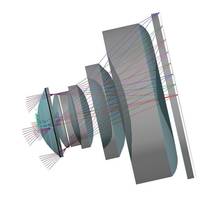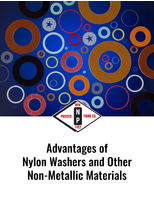Latest CODE V 11.3 Optical Design Software Comes with CAD Model Support
Press Release Summary:

- Offers two freeform surface shapes: Q2D Freeform Asphere and Extended Fringe Zernike
- Features SpecBuilder that helps designers track and communicate whether project specifications and goals meet optical system designs
- Extends optical engineering leadership with enhanced optomechanical product design and visualization
Original Press Release:
Synopsys Introduces New CODE V Release with Enhanced Optomechanical Product Design and Visualization
CODE V Version 11.3 Extends Optical Engineering Leadership with New Features for CAD Modeling, Freeform Optics Design, and Project Management
MOUNTAIN VIEW, Calif., Dec. 17, 2019 /PRNewswire/ -- Synopsys, Inc. (Nasdaq: SNPS) today announced version 11.3 of its CODE V® optical design software, which introduces new capabilities that empower designers to create, simulate, and visualize optomechanical systems faster and more efficiently than ever. Highlights include:
- Expanded CAD Model Support. CODE V's CAD model support has been augmented with flexible options to load CAD surfaces for ray tracing and 3D visualization. Ray-traceable CAD surfaces allow designers to evaluate the impact of mechanical structures on optical performance. These surfaces can be defined both sequentially and non-sequentially to provide design flexibility and fast simulations. CODE V also allows designers to import CAD surfaces into the lens model for mechanical visualization only. Visualization CAD surfaces are automatically excluded from ray trace simulations, without the need for designers to specify custom surface attributes. CODE V's unique combination of ray-traceable CAD and visualization CAD surfaces saves time in sequential and non-sequential design work.
The enhanced CAD modeling capabilities in CODE V help users visualize volume constraints, define complex aperture shapes for blocking and obstructing rays, easily create complex prism geometries, and much more. These capabilities can also be useful for designing and visualizing unusual surface shapes, such as those used in aerospace and automotive applications, including heads-up displays (HUDs).
- New Freeform Surfaces for Compact Optical Systems. CODE V offers two new freeform surface shapes: Q2D Freeform Asphere and Extended Fringe Zernike. Both of these surface types can include X and Y offsets of the aspheric departure from the surface coordinate system and can redefine the Z axis of the surface coordinate system relative to the Z axis of the base conic. The new freeform surfaces provide unique, superior correction in systems with significant tilts and decenters, which can be particularly useful for designing lightweight and compact optical systems, such as those in AR/VR systems. In addition, a new 2D coefficient grid window makes it easy to preserve desired symmetries in the optical system using freeform surfaces.
- SpecBuilder™ Feature Improvements. The CODE V SpecBuilder feature helps designers easily track and communicate how well their optical system designs meet project specifications and goals. Version 11.3 expands the library of pre-built project specifications based on Synopsys' optical engineering expertise. New specs include chief ray and point spread function centroid-based lateral color, element and system weight, and differential expansion of cemented components.
"The CAD visualization feature in CODE V has proven to be a useful tool for viewing multiple subsystems simultaneously, as well as comparing my current optical layout to that of a previous revision," said Dr. Anthony Vella, optical engineer at Lawrence Livermore National Laboratory. "It has allowed me to visualize the system throughout the design process before exporting the final optical model to CAD software."
"Instrument accommodation into a satellite is a primary objective with limited freedom," said Dr. Sergio Mottini, optical engineer at Thales Alenia Space. "In the past, I've needed assistance from CAD specialists to validate the compatibility of my optical designs with mechanical configurations. CODE V's CAD capability provides a single tool to perform this validation and save time."
"CODE V is expertly developed, tested, and supported," said Stuart David, group director of applications engineering in Synopsys' Optical Solutions Group. "We are proud to empower our customers to build their best optical systems with software that delivers unmatched technical depth and accuracy. With CODE V 11.3, we have extended our technical leadership with new pre-built design specifications and freeform surface types, as well as new CAD prototyping features that streamline optical design and optomechanical layout processes."
About CODE V
CODE V software is an optical engineering and design solution that supports the optimization, analysis, and tolerancing of image-forming optical systems and free-space photonic devices. For more than 40 years, CODE V has enabled engineers to produce accurate virtual prototypes leading to superior, manufacturable optical systems. For more information, visit https://www.synopsys.com/optical-solutions/codev.html.
About Synopsys
Synopsys, Inc. (Nasdaq: SNPS) is the Silicon to Software™ partner for innovative companies developing the electronic products and software applications we rely on every day. As the world's 15th largest software company, Synopsys has a long history of being a global leader in electronic design automation (EDA) and semiconductor IP and is also growing its leadership in software security and quality solutions. Whether you're a system-on-chip (SoC) designer creating advanced semiconductors, or a software developer writing applications that require the highest security and quality, Synopsys has the solutions needed to deliver innovative, high-quality, secure products. Learn more at www.synopsys.com.
Editorial Contact:
James Watts
Synopsys, Inc.
650-584-1625
jwatts@synopsys.com
Synopsys, Inc.
Web Site: http://www.synopsys.com



